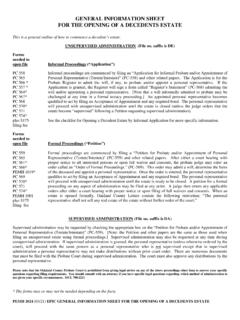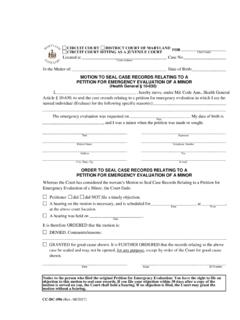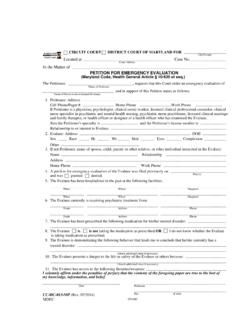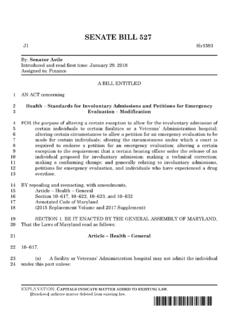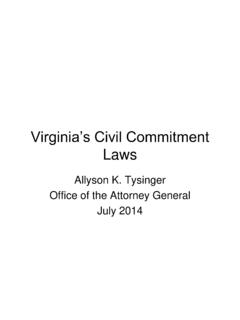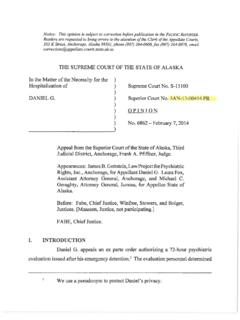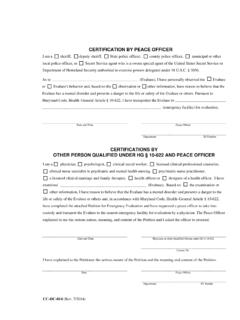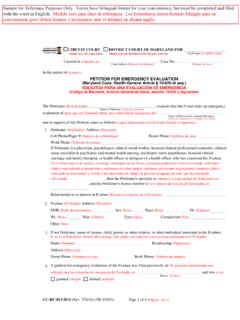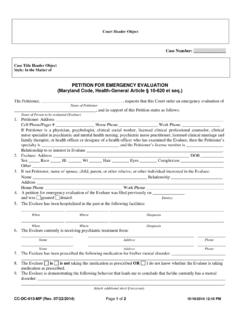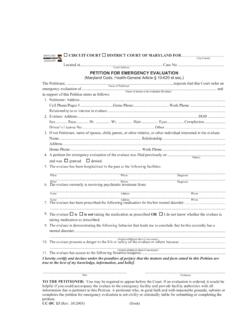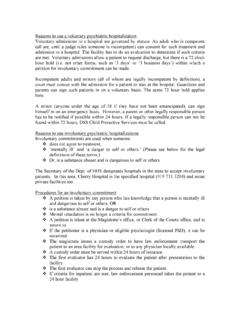Transcription of Information for Users of Mental Health Services
1 Information for Users of Mental Health Services Oakland County Probate Court Honorable Jennifer Callaghan Honorable Linda S. Hallmark Honorable Daniel A. O'Brien Honorable Kathleen A. Ryan # 11 in a series of brochures presented to you by the Oakland County Probate Court INTRODUCTION If you are concerned about the Mental Health of a family member or a friend, you may be asking the Oakland County Probate Court Mental Health Division for Information and assistance. This pamphlet will answer many of your initial questions. The Probate Court staff will make every effort to answer any additional questions you may have and to help you through the Court process. WHAT IS Mental ILLNESS UNDER THE Mental Health CODE? MCL (g) Mental illness is, by law, a substantial disorder of thought or mood that significantly impairs judgment, behavior, capacity to recognize reality, or ability to cope with the ordinary demands of life.
2 You may be asking the Probate Court to help you obtain treatment for a mentally ill person. You must understand that according to the Mental Health Code, it is not enough for a person to be diagnosed as mentally ill ; he/she must also be considered an adult person requiring treatment or a minor requiring treatment for the Court to become involved. The definitions follow: WHO ARE ADULT PERSONS REQUIRING TREATMENT ? A person requiring treatment must have Mental illness and any of the following: Can reasonably be expected within the near future to intentionally or unintentionallyseriously harm himself/herself or another person, and who has already done so orthreatened to do so, OR Is unable to attend to his/her basic physical needs such as food, clothing, or shelter, OR Is unable to understand his/her need for treatment which may result in significantphysical harm to himself/herself or to Exceptions: An adult who has been affected by age, epilepsy, alcoholism, or drug dependence is not necessarily a person requiring treatment.
3 The person must also meet at least on of the three requirements noted above. MCL (2) WHO ARE MINORS REQUIRING TREATMENT ? A minor requiring treatment means either of the following: A minor with a substantial disorder of thought or mood that significantly impairsjudgment, behavior, capacity to recognize reality, or ability to cope with the ordinary demands of life OR MCL (b)(i) A minor having a severe or persistent emotional condition characterized by seriouslyimpaired personality development, individual adjustment, social adjustment, oremotional growth, which is demonstrated in behavior symptomatic of (b)(ii) Exceptions: A minor shall not be determined to be a minor requiring treatment solely on the basis of one or more of the following conditions: Epilepsy.
4 Developmental Disabilities. Drug or alcohol use, dependence, or addiction. Juvenile offenses, including school truancy, home truancy, or incorrigibility. Sexual Activity. Religious or political activity or (5) HOW IS PSYCHIATRIC TREATMENT OBTAINED? Minors A request for hospitalization is made to a facility by the minor s parent, a guardian, a person who has either legal or physical custody, and provides support and care for the minor, or the Department of Human Services (if minor is a ward), or the minor (if 14 years of age or older), or a police officer. MCL (a) The minor must require treatment , must be in need of hospitalization and be expected to benefit from hospitalization; and there must not be an appropriate, less restrictive alternative to hospitalization available.
5 MCL (b) Adults An adult may consent to voluntary treatment at a facility of his/her choice without involvement of the Court. The patient is permitted to leave, but if the facility determines that the patient needs to remain, that patient may be retained, a petition would be filed with the court, and a hearing would be held. WHERE CAN PSYCHIATRIC TREATMENT BE OBTAINED? Voluntary treatment of an adult or minor may be obtained at any private or public facilitywilling and able to accept the patient. If voluntary treatment is not possible and the Court must become involved, the Court mayorder treatment. Community Mental Health Services keeps a complete list of all facilities that offer voluntaryand involuntary treatment of adults and TRANSPORT OF A PERSON FOR evaluation There are basically three ways to have a person transported to Common Ground Crisis Services for an emergency evaluation if the person does not voluntarily agree to treatment.
6 Protective Custody MCL If a police officer observes someone acting in a manner which causes the officer to reasonably believe that the adult is a person requiring treatment or that the minor is a minor requiring treatment and presents a serious danger to self or others, the officer may take the individual into protective custody and transport to a hospital, without the necessity of obtaining a Transport Order from the Court. Transport by Medical Certification MCL If an adult agrees to be examined by a physician or psychiatrist and the doctor concludes that the individual is a person requiring treatment, a Court order is not necessary. The doctor completes a Clinical Certificate, and the family member or friend completes a petition /Application for Hospitalization.
7 These two documents are shown to the police or Ambulance Company so that the person may be transported. They are only good for 72 hours from the completion of the Clinical Certificate. No Court involvement or Court hearing is necessary to have the patient transported and evaluated. A Probate Court hearing will be held, however, within seven days of the Court s receipt of the paperwork, to determine if the patient should remain hospitalized. Court Order to Transport MCL You may find it necessary to seek Probate Court s Mental Health Division s assistance in obtaining an Order to Transport the individual to Common Ground Crisis Services for evaluation and examination. You (the petitioner ) must have personally observed recent examples of behavior or speech evidencing Mental illness.
8 For minors, an initial screening must be completed through Common Ground Crisis Services . Our staff will remind you that an Order to Transport should be the last resort and that every effort should be made to obtain voluntary treatment or examination before the Court becomes involved. You will need to complete a petition and Order for Examination and petition /Application for Hospitalization and testify at the emergency hearing, which is held the same day. The police and/or an ambulance company are generally called by the petitioner to transport the person to Common Ground Crisis Services . **Note that if the minor is hospitalized by any of the above methods, there is no further Court involvement or hearings unless the minor or his/her parents or guardian wish to terminate hospitalization against the facility s medical advice.
9 WHERE AND HOW IS A petition FILED? The Mental Health Division of the Oakland County Probate Court1200 North Telegraph Road, Dept. 457, Pontiac, Michigan, 48341-0457 All Court forms are available at that office or online at Office Hours are Monday through Friday, from 8:00 until 4:30 The alleged mentally ill person must be a resident of or found in Oakland County before apetition will be accepted. The petitioner must be 18 years of age or older. There are no filing HAPPENS AFTER THE petition IS FILED? If you have found it necessary to file a petition with the Probate Court and if the individualhas been transported to Common Ground Crisis Services , an evaluation will be made within 24 hours. MCL (1) If the examining physician or psychologist does not find that the individual is a personrequiring treatment, the individual shall be released immediately.
10 MCL (1) If the examiner signs a Clinical Certificate, the individual will be hospitalized pending thehearing, which must be set within seven days. MCL Unless the patient has his/her own attorney, the Court will appoint an attorney to representhim/her. MCL (2) The patient may be billed for some or all of the attorney fees, unless the patient is foundindigent. MCL (5) Community Mental Health Services will prepare an Alternative Treatment Report that theJudge will study to determine if there is a better alternative than A meeting (sometimes called the deferral ) will be held (within 72 hours of filing thepetition) with the patient at the facility at which time the Court process will be explained,and he/she will be given the opportunity to accept the proposed plan of treatment, with thecondition that he/she has the right to request a hearing at any time, and a hearing must beconvened by the Court within seven days.








